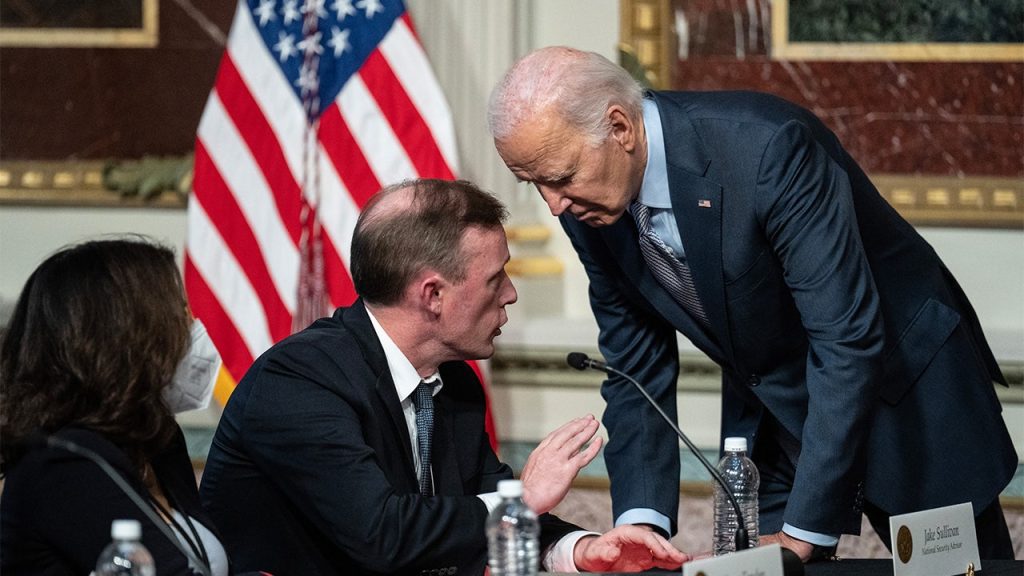The Biden administration is actively grappling with the complex challenge posed by Iran’s nuclear ambitions, a situation further complicated by regional instability and the looming 2024 presidential election. Recent reports indicate that President Biden was presented with a range of military strike options against Iran’s nuclear program during a high-level meeting with National Security Advisor Jake Sullivan. While the White House has not officially confirmed these discussions, the reports suggest that no decisions have been made and that no active planning for a military strike is currently underway. The information presented to President Biden reportedly outlined various scenarios and corresponding response options, focusing on the potential consequences of Iran crossing certain, yet undefined, thresholds in its nuclear development. This underscores the administration’s ongoing assessment of the situation and its commitment to preventing Iran from acquiring a nuclear weapon.
The deliberations within the Biden administration highlight a delicate balancing act. The President has publicly committed to preventing Iran from developing a nuclear weapon, but the exact circumstances that would trigger a military response remain ambiguous. This ambiguity is likely intentional, serving as a deterrent while avoiding a premature commitment that could escalate tensions. Complicating the situation is the fact that Iran has already amassed near-weapons-grade uranium and is actively enhancing its weaponization capabilities, raising concerns about its true intentions. The administration’s challenge lies in accurately assessing the imminence of the Iranian nuclear threat and determining the appropriate response, all while navigating the complex geopolitical landscape and the potential for unintended consequences.
The timing of these discussions is particularly noteworthy, occurring just months before the 2024 presidential election. The political implications of a military strike on Iran are significant, and the administration must weigh the potential domestic and international fallout. Any decision to use force would undoubtedly face intense scrutiny and could have a profound impact on the presidential race. The Biden administration’s internal debates reflect a cautious approach, with a focus on understanding the potential ramifications of any military action. The President is reportedly concerned about the justification for a strike and the potential for escalation, particularly in the context of a transition to a new administration.
Further complicating the situation are the dynamics between the United States and Israel. President Biden has consistently cautioned Israel against striking Iran’s nuclear facilities, mindful of the potential for a broader regional conflict. However, some advisors within the administration argue that the current circumstances present a unique opportunity to effectively disrupt Iran’s nuclear program. They point to the weakened state of Iran’s air defenses, missile capabilities, and proxy forces as factors that increase the likelihood of a successful strike and minimize the risk of retaliation. This divergence of opinion within the administration reflects the complex and multifaceted nature of the Iranian nuclear issue and the difficulty in reaching a consensus on the appropriate course of action.
Sullivan’s role in these discussions appears to be primarily informative, presenting the President with various scenarios and their potential implications without advocating for a specific course of action. This approach allows the President to make a fully informed decision based on a comprehensive understanding of the risks and benefits associated with each option. The administration’s focus on the “degraded nature” of Iran’s military capabilities suggests a pragmatic assessment of the potential for a successful strike with minimal risk of escalation. However, the absence of clearly defined “red lines” regarding Iran’s nuclear program maintains a degree of strategic ambiguity, which can serve as both a deterrent and a source of uncertainty.
Sullivan’s public statements further illuminate the administration’s thinking on this issue. He has acknowledged the evolving nature of the threat posed by Iran, noting that the strategic blows dealt to the regime in recent years could paradoxically incentivize it to accelerate its nuclear program. This observation underscores the complexity of the situation and the need for a nuanced and adaptable approach. The administration’s careful consideration of these factors demonstrates a commitment to responsible decision-making in the face of a complex and potentially volatile situation. The ongoing deliberations within the Biden administration reflect a recognition of the high stakes involved and the need for a comprehensive and well-informed strategy to address the Iranian nuclear threat.

